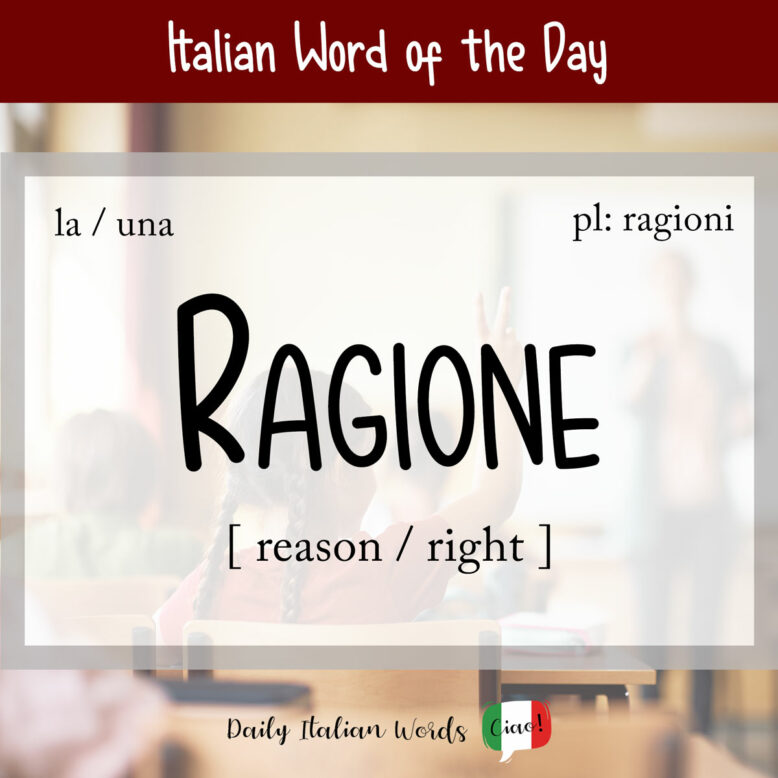In most instances, the Italian word ragione directly corresponds to our English word reason.

First and foremost, both reason and ragione denote the human ability to think, comprehend, and engage in logical reasoning.
Some common expressions related to this definition of ragione include:
- perdere il lume / l’uso della ragione = to lose one’s ability to reason / lose one’s mind
- riacquistare l’uso della ragione = to regain the ability to reason
- ascoltare la voce della ragione = to listen to the voice of reason
- agire contro ragione = to act irrationally
- smarrire la ragione = to lose one’s mind
Sono contento che tu abbia ascoltato la voce della ragione.
I’m glad you listened to the voice of reason.
Furthermore, ragione can be translated as reason when it conveys the meaning of motive, cause, or explanation. For example, chiedere ragione di (qualcosa) means to ask for an explanation.
Avevo le mie buone ragioni per pensarlo.
I had good reason for thinking that.

You can also expect to hear ragione in the following set expressions:
- a maggior ragione = all the more reason / even more so
- a ragione = with good reason
- di santa ragione = harshly
- chi di ragione = to those concerned
- a ragione o a torto = rightly or wrongly
However, the translation that most learners are familiar with is not reason at all but rather right, as in the widely used expression avere ragione (to be right).
Perché pensi sempre di avere ragione?
Why do you always think you’re right?

You can modify this expression by adding the preposition di (of) after avere ragione to create avere ragione di (qualcuno). This phrase implies getting the better of someone or having the upper hand.
Ha avuto ragione del suo avversario.
He got the better of his opponent.
Dare ragione a qualcuno, on the other hand, means to back someone up or agree with them.
A very common expression you will encounter in Italian is farsi un ragione di qualcosa (or farsene un ragione). This phrase is used when you come to terms with, to get over, or to make one’s peace with something that is unpleasant, such as a break-up or failure.

Fattene una ragione!
Get over it!
Yet another possible translation for ragione is ratio, rate or proportion. For instance, the expression in ragione di means in proportion to, whereas in ragione del 5% translates as at the rate of 5%.
Finally we have the word ragione sociale, which means company title or trade name in commercial terms.
Heather Broster is a graduate with honours in linguistics from the University of Western Ontario. She is an aspiring polyglot, proficient in English and Italian, as well as Japanese, Welsh, and French to varying degrees of fluency. Originally from Toronto, Heather has resided in various countries, notably Italy for a period of six years. Her primary focus lies in the fields of language acquisition, education, and bilingual instruction.


